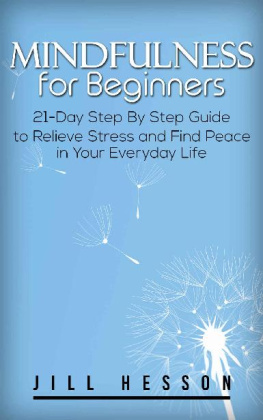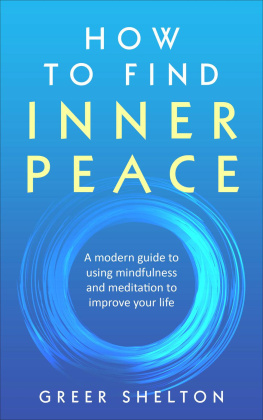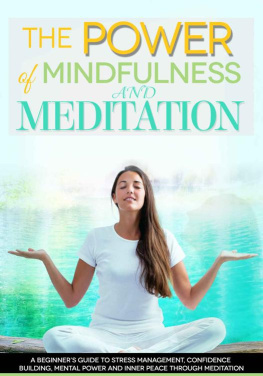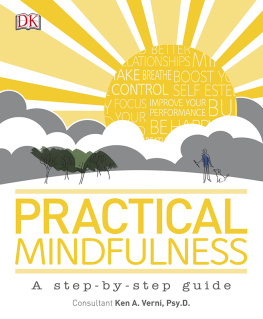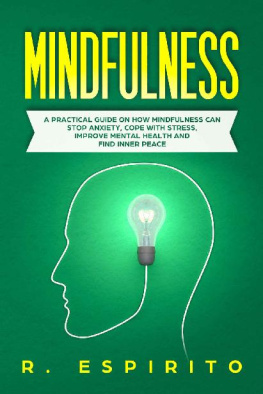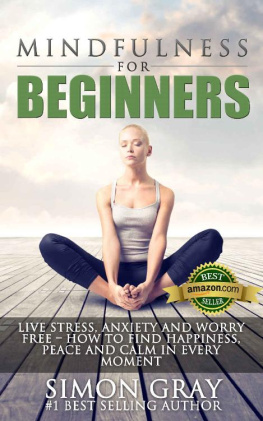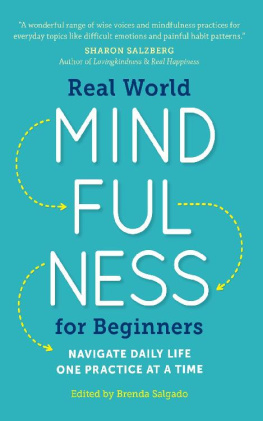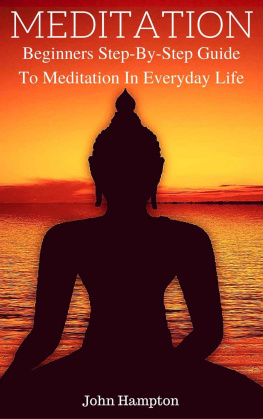Mindfulness for Beginners
21-Day Step By Step Guide to Relieve Stress and Find Peace in Your Everyday Life
Copyright 2016 by Jill Hesson - All rights reserved.
This document is geared towards providing exact and reliable information in regards to the topic and issue covered. The publication is sold with the idea that the publisher is not required to render accounting, officially permitted, or otherwise, qualified services. If advice is necessary, legal or professional, a practiced individual in the profession should be ordered.
- From a Declaration of Principles which was accepted and approved equally by a Committee of the American Bar Association and a Committee of Publishers and Associations.
In no way is it legal to reproduce, duplicate, or transmit any part of this document in either electronic means or in printed format. Recording of this publication is strictly prohibited and any storage of this document is not allowed unless with written permission from the publisher. All rights reserved.
The information provided herein is stated to be truthful and consistent, in that any liability, in terms of inattention or otherwise, by any usage or abuse of any policies, processes, or directions contained within is the solitary and utter responsibility of the recipient reader. Under no circumstances will any legal responsibility or blame be held against the publisher for any reparation, damages, or monetary loss due to the information herein, either directly or indirectly.
Respective authors own all copyrights not held by the publisher.
The information herein is offered for informational purposes solely, and is universal as so. The presentation of the information is without contract or any type of guarantee assurance.
The trademarks that are used are without any consent, and the publication of the trademark is without permission or backing by the trademark owner. All trademarks and brands within this book are for clarifying purposes only and are the owned by the owners themselves, not affiliated with this document.
BONUS: FREE Beginners Guide to Meditation
Have you tried meditation to solve your stress and health problems? If you havent done so yet, now may be one of the best times to make that experience a reality. Meditation is one of the most sought after forms of stress relief and is even recommended by many doctors. => Click Here for FREE Access

In meditation, you transform the way that your mind is working. While you cant say that its a simple process, meditation is something that you can easily learn to do and then use daily.
Click Here for FREE Access
Table of Contents
Introduction
If you have found that life is putting too many strains on you, or that the load that you are left to carry is too heavy, mindfulness may be the answer. People work their minds too hard sometimes. We are taught to think about our actions before we actually put them into practice. We are taught to think before we speak. In todays society, if we had time to relax and enjoy life, its unlikely that we would, because such are the demands of a modern era. However, when you find out about mindfulness and start to use it, you begin to see things in a very different light. For example, you notice things you didnt notice before. Why? The problem with our philosophy on life is that we tend to look inward instead of seeing whats going on around us.
There are many books on mindfulness and some of them are useful while others seem to be regurgitated information, rather than being of any substance. The difference with this book is that its written by someone who teaches people to use mindfulness to help improve the quality of their lives. Mindfulness isnt a fad. In fact, it has been taken so seriously by doctors that prescriptions are even being written for students to attend classes to help them to get over the problems associated with stress and anxiety. The success rate is astounding when you compare with traditional treatment using medications. Did you know, for example, that statistics show that in America today, the use of medications for stress related illnesses has increased to a worrying degree but that the figures of people who suffer from anxiety are not going down? Doesnt that tell you something about the efficiency of traditional treatment?
In this book, we look at the possibility of using Mindfulness to be more aware of life, rather than hiding behind medication. Our 21-day step-by-step approach should be sufficient to make you feel less stressed by the end of the 21 days and ready to embrace a fresh approach to anxiety. You wont feel overwhelmed by it. You will feel that you are more in control of your life and you will also feel calmer in demeanor. We would suggest that you follow the steps within the book and try it. You have nothing to lose if you are already stressed to the max and are looking for a solution. Doctors in the United Kingdom have been using Mindfulness to help those suffering with stress because they have recognized that there is little benefit in stifling people with medications that cause patients to be trapped in a vicious cycle. I am depressed Take anti-depressants Hide behind the drugs so that you dont have to face the world or the reasons for your unhappiness. Now look at what Mindfulness does. I am depressed though willing to seek out solutions to make my life better, and will use Mindfulness to achieve inner peace and happiness. I know which way you would rather go.
Chapter 1 Introduction to Mindfulness Days 1-3
If you want to conquer the anxiety of life, live in the moment. Live in the breath ~ Amit Ray
If you are on medication for anxiety related illnesses, it is not suggested that you come off these medications without any kind of medical supervision, but you can start to introduce mindfulness into your life even when you are taking these medications. The problem with taking medications is that you cant just go cold turkey and should not put your body through this kind of treatment. We suggest that you follow the steps shown in this book and when you feel a lot stronger, you can approach your medical professional and adjust your medication, so that you take control of your life.
Day one to three
Step 1 Learning how your subconscious mind works
Your mind is programmed by the life that you live. All the time, your subconscious mind records all of your responses to stimuli. The subconscious doesnt deal with things such as emotions. If you are afraid of snakes and see one, your mind will know that the right way for you to react is to be afraid. Therapists who deal with anxiety such as this usually suggest introducing stimuli in small controlled doses until your mind is able to feel more comfortable with that particular thing. However, life works that way as well. When you are angry, for example, your subconscious recognizes the thing that made you angry. The next time that thing happens, you will be angry again.
However, you can change the pattern of events because if you show your subconscious mind another reaction to those stimuli, it will relearn your pattern of behavior and will not expect you to get angry given the same circumstances once your mind is trained. The reason mindfulness is so useful is because it empties out preconceptions. You are told to empty the mind of thought and thats contrary to everything we know about reacting. Your subconscious has much more time to work because its not crowded out with thoughts either negative or positive and is able to help you to see things in a much clearer light.
One of the stumbling blocks that people come across that stops them from being positive is that they dont know how to relax. In this step, we teach you to relax as it forms a very important part of mindfulness. When you meditate, for example, you are mindful of your breathing. The trouble with this advice is that most people dont know how to breathe properly. They assume that air going in and out of the body is sufficient to sustain life, but they dont see it as more than that.

